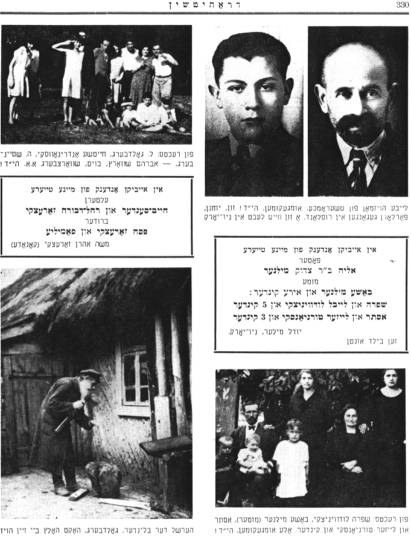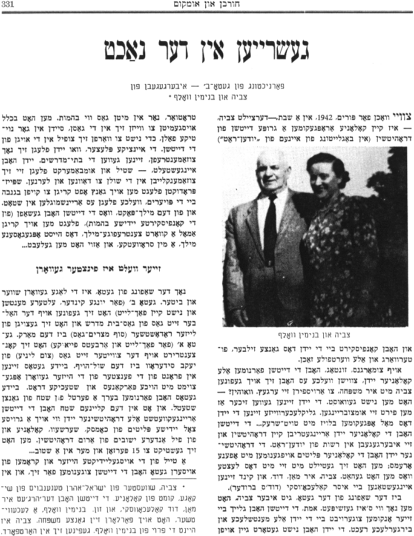Previous Page |
Next Page

[Page 330]
[Photo:] Leibe Hausman of Tcheromcha, perished. May G-d avenge his blood! Son, Yochanan, lost somewhere in Russia. A son, Chaim, lives in New York.
[Box:] An eternal memorial to my dear father, Eliyahu the son of Tzadok Milner; my aunt Basha Milner and her children: Shifra and Leibel Ludvinsky and five children; Esther and Leizer Torniansky and three children.
Yudel Miller, New York
See photo below
[Photo:] From right: Shifra Ludvinsky, Basha Milner (mother), Esther and Leizer Torniansky and children. All perished. May G-d avenge their blood!
[Photo:] from right: L. Goldberg, Chaytsha Andrinovsky, H. Steinberg – Avraham Schwartz, Baum, Schwartzberg and others. May G-d avenge their blood!
[box:] An eternal memorial to my dear parents, Chaim-Sender and Rachel Devorah Zaretsky; brother Pesach Zaretsky and family (Canada).
[photo:] Hershel the Blind Goldberg chops wood next to his house.

[Page 331]
SCREAMS IN THE NIGHT
The extermination of Ghetto B – reported by Zvia and Binyamin Wolf*
Zvia reported that two weeks before Purim, 1942, on the Sabbath, a group of Germans from Drohitchin (accompanied by someone from the Judenrat) came to Kolonia and confiscated all the silver of the Jews, their furs and other valuable property. The next day, Sunday, the Germans rounded up all the Jews in Kolonia, among whom were Zvia and her family, to send them somewhere. But where? No one knew. The Jews were sure that they were going to be killed. Luckily, the Jews were only frightened, and the Germans took them to Drohitchin and turned them over to the Judenrat. The Jews in Drohitchin welcomed them with open arms; they shared the last of whatever they possessed. Zvia, her husband David and child stayed in the home of Isser Kalekhovsky (David's brother).
Until the ghetto was created, reported Zvia, people barely got by. The truth was that the Germans had robbed the Jews of all human and civil rights as soon as the Germans arrived. The Jews did not dare go onto the sidewalk, only in the street with the animals. They avoided even being in the street unless absolutely necessary so as not to become too obvious to the Germans. The only places where Jews would still meet each other was in the synagogues. Jews took risks, quietly and unnoticeably gathering in the synagogues for prayer and study. They also managed to purchase food products from the peasants without being noticed, and would smuggle the food into town. They also occasionally brought in a quart of milk that was actually a kind of whey, from what the Germans had produced from the confiscated animals.
Their world turned dark
After the creation of the ghetto, the situation turned harsh and bitter. Ghetto B (for young children, the elderly and the unskilled) was located on half of the synagogue street, from Leizer Radoshcher (at the end of Egypt Street) to the market. Ghetto A (for skilled workers and professionals) was concentrated on the other side of the street (toward the train), from Yaakov Siderov to the synagogue courtyard. Facing the windows of the houses in both ghettos a high fence and barbed wire was installed. Both ghettos were in approximately one quarter of the area of the entire town, and in this small area the Germans squeezed in all the Jews in Drohitchin as well as a large number of Jewish refugees from Khomsk, Shershev, Kolonia and many other settlements around Drohitchin. Fifteen and even more people were housed in a single home.
Some of the abandoned houses and stores outside the ghetto were taken over by the Germans themselves, and in the others they moved in Christian families.
Previous Page |
Next Page
This material is made available by JewishGen, Inc.
and the Yizkor Book Project for the purpose of
fulfilling our
mission of disseminating information about the Holocaust and
destroyed Jewish communities.
This material may not be copied,
sold or bartered without JewishGen, Inc.'s permission. Rights may be
reserved by the copyright holder.
JewishGen, Inc. makes no representations regarding the accuracy of
the translation. The reader may wish to refer to the original material
for verification.
JewishGen is not responsible for inaccuracies or omissions in the original work and cannot rewrite or edit the text to correct inaccuracies and/or omissions.
Our mission is to produce a translation of the original work and we cannot verify the accuracy of statements or alter facts cited.
 Drogichin, Belarus
Drogichin, Belarus
 Yizkor Book Project
Yizkor Book Project
 JewishGen Home Page
JewishGen Home Page
Yizkor Book Director, Lance Ackerfeld
This web page created by Lance Ackerfeld
Copyright © 1999-2026 by JewishGen, Inc.
Updated 3 Dec 2001 by LA


 Drogichin, Belarus
Drogichin, Belarus
 Yizkor Book Project
Yizkor Book Project
 JewishGen Home Page
JewishGen Home Page